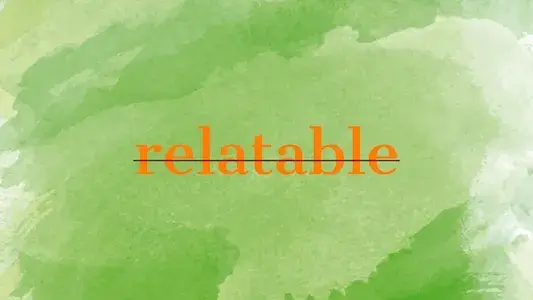Relatable (a language gripe)



I do not like the word relatable.
In the current environment of social and cultural crises – revelations of sexual assault and harassment, school shootings, the murder of indigenous youth going unpunished... – my gripe about a single word is inconsequential. But language does matter, the words we use reflect and shape how we view the world, and "relatability" is, in a way, an erasure – or perhaps more accurately – a devaluation of difference.
I'm not a slave to "proper" English. I value clarity and precision, but I understand that what makes for effective communication varies. Context matters, as does the identity of those on either side of the message. Relatable does seem to communicate a clear idea to many people, but it also obscures. A story or character that seems "relatable" to some people is likely to be very "unrelatable" to others.
I admit, my initial distaste for relatable had nothing to do with social consciousness. When I first noticed it showing up in student papers, I objected to relatable simply because it seemed like lazy writing, a lack of effort in describing the specific appeal of whatever was being described.
Some writers and speakers will actually pinpoint qualities or characteristics that support the relatable judgement. In these cases listeners, readers, and so on, at least have an idea why someone (presumably an audience member) might feel inclined to relate. The who, however, tends to remain assumed rather than explicit. Which makes the who being left out even more difficult to recognize.
If I dig a little deeper into my distaste for the word relatable, I realize that it may actually be the idea of "relatability" that's a big part of the problem. What irks me, especially, is a particular connotation that relatable seems to carry, at least where I've seen and heard it used: that to call something "relatable" is a high compliment, that "relatability" is a worthy and admirable achievement, that really what audiences want is just mirror versions of themselves.
Sure, I enjoy being able to relate to elements of what I hear, watch or read. But that's not enough. If I want more than just a mirror of some aspect of myself, then I also want to be confronted with things and people I can't easily relate to. I might aspire to find some kind of connection, but if the connection is already there and easy to see, then the work is already done... What I learn then is that others are in some way like me, and if not, then it doesn't matter – then they don't matter...
Well, I do not believe that and don't want to. So please save me from the curse of "relatability" and keep challenging me to find the value in experiences and identities that are far beyond my own and myself.